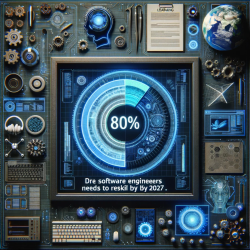With the dynamic development of artificial intelligence (AI) technology, software engineering is entering a new era. Experts predict that creating AI-integrated software will require a new type of specialist—the AI engineer. According to a Gartner report, by 2027, generative AI will create entirely new roles in software engineering and IT operations, forcing up to 80% of engineers to upskill.
Will AI replace engineers? Although AI will significantly change the way software engineers work, it doesn’t mean their elimination. "AI will transform the future role of software engineers, but human knowledge and creativity will remain essential for developing complex, innovative software solutions."
Three Phases of Software Engineering Transformation
The impact of AI on software engineering will evolve in three ways:
- Short-term improvements:
In the near term, AI will increase engineers’ productivity by automating some processes, though its impact will be limited. AI will mainly assist the most experienced engineers working in organizations with mature engineering practices.
- Mid-term change in work patterns:
In the medium term, AI agents will gradually change the way developers work by automating more tasks. In this phase, skills related to natural language engineering and RAG (retrieval-augmented generation) techniques will become crucial, as AI will begin generating most of the code, and engineers' roles will evolve toward managing and optimizing processes.
- Long-term expansion of AI engineering:
In the long term, AI development will significantly enhance the efficiency of software engineering, which in turn will generate even greater demand for skilled professionals. Organizations will need to invest in advanced AI technologies to meet the growing demand for AI-supported software.
AI/ML Engineer – The Most Sought-After Role in 2024 According to a Gartner survey conducted in the fourth quarter of 2023, 56% of heads of software engineering in the US and UK indicated that the most in-demand role for 2024 would be the AI/ML engineer. The ability to leverage artificial intelligence and machine learning in applications is currently the biggest skills gap, further confirming the need for IT professionals to upskill. "An AI engineer is a modern professional who combines advanced skills in software engineering, data science, and artificial intelligence and machine learning," says Philip Walsh. "These skills are already highly valuable and will become even more sought after."
What Must Companies Do?
To meet the challenges of AI development and provide proper support for AI engineers, organizations must invest in modern AI software platforms. Such platforms will enable more efficient implementation of AI capabilities and the integration of AI-based solutions into large corporate environments.
However, as Walsh emphasizes, "Investing in technology is only part of the success. Organizations will also need to upskill their engineering and platform teams to be able to implement tools and processes that support the continuous integration and development of AI artifacts."
Artificial intelligence won’t replace software engineers, but it will completely change their role and way of working. By 2027, up to 80% of professionals in this field will need to acquire new skills to meet the challenges associated with AI. Investing in AI-related training and technology will become a priority for both employees and employers who want to remain competitive in the modern digital world.

